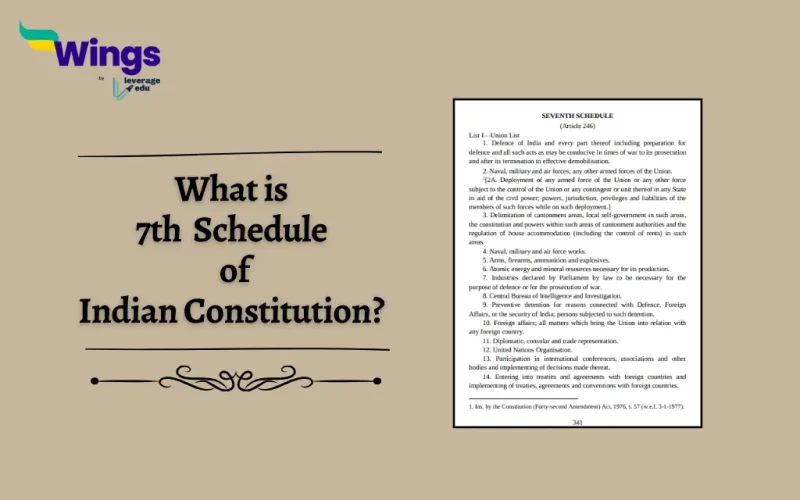7th Schedule of Indian Constitution deals with the division of legislative powers between the State Governments and the Union Government under Article 246. It details the 3 Lists which are the Union List(97 Subjects), State List(66 Subjects) and Concurrent List(47 Subjects). Furthermore, this division of lawmaking prevents conflicts and encourages a coordinated approach to governance.
Also Read: Important Amendment of the Indian Constitution
The Union List
Table of Contents [show]
This list comprises 97 items that fall under the exclusive domain of the Union Parliament. Moreover, these subjects are considered essential for national unity and require a centralised approach. For example:
- Defence of India: This includes the armed forces, war readiness, and post-war demobilisation.
- Foreign Affairs: The Union Government manages all international relations and diplomatic engagements.
- Currency, Coinage and Reserve Bank of India: In addition, maintaining a uniform monetary system is important for a stable national economy.
- Inter-State Trade and Commerce: The Union Parliament regulates trade between different States to guarantee the smooth flow of goods and services.
Also Read: Important Articles in Indian Constitution Explained
The State List
This list entrusts State Legislatures to make laws on 66 subjects that directly impact citizens’ daily lives. Additionally, these matters are best addressed at the State level, hence considering regional differences and needs. For example:
- Public Order (Police): Maintaining law and order within a State is a primary responsibility of the State government.
- Public Health and Sanitation: States are responsible for managing healthcare infrastructure, sanitation facilities, and disease control within their borders.
- Agriculture: State governments frame policies and regulations related to farming practices, irrigation, and agricultural markets.
- Intra-State Trade and Commerce: States have the power to regulate trade within their boundaries.
Also Read: Sources of Indian Constitution
The Concurrent List
This list contains 47 subjects where both the Union Parliament and State Legislatures can make laws. However, in case of a conflict between a Union law and a State law on a Concurrent List subject, the Union law succeeds. Furthermore, this allows for a national framework with room for State-specific adaptations. For example:
- Education: The Union sets broad guidelines, while States can develop specific curricula and manage schools.
- Forests: Balancing national conservation efforts with localised needs is achieved through cooperation.
- Electricity: The Union establishes a national grid framework, while States manage distribution within their territories.
Related Blogs
| The Important Acts in India | Functions and Responsibilities of State |
| What is Universal Adult Franchise? | Representation of People’s Act |
I hope this blog answers your query on What is 7th Schedule of Indian Constitution. Moreover, you may even read more blogs and empower yourself with knowledge regarding Civics and Polity!
 One app for all your study abroad needs
One app for all your study abroad needs















 45,000+ students trusted us with their dreams. Take the first step today!
45,000+ students trusted us with their dreams. Take the first step today!
